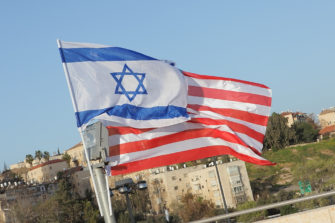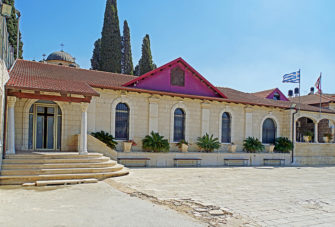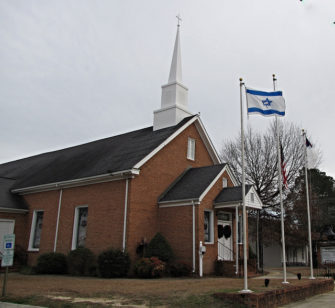
In the days before and following President Trump’s decision “to officially recognize Jerusalem as the capital of Israel” and to direct the US State Department “to begin preparations to move the American embassy from Tel Aviv to Jerusalem,” political pundits sprang into action, asking who, exactly, was responsible for this policy change.
The speech seemed to contradict a strategy presented by Jared Kushner a few days before, leading to the resignation of Dina Powell, so official Jewish influence was apparently off the table. That the speech was delivered against a backdrop featuring a portrait of George Washington, a Christmas tree, and a steely-eyed Vice President Mike Pence pointed to evangelical Christian influence. Melani McAlister has recently argued that evangelical politics are far too fragmented for such a clear line to be drawn; Jonathan Tobin, writing in Ha’aretz, exonerated both “the Christians” and “the Jews” and pointed the finger at Trump himself.
Although Christian Zionism—which I define as “political action, informed by specifically Christian commitments, to promote or preserve Jewish control over the geographic area now comprising Israel and Palestine”[1]—has been my academic pita and hummus over the past few years, I am inclined to follow the complementary analyses by McAlister and Tobin. I differ with Tobin, however, in my assertion that Trump’s logic on Jerusalem is a product of American cultural presuppositions themselves informed by Anglo-American Christian Zionism and its theopolitical antecedents. Christian Zionists in the United States—most of whom are evangelicals—are right to view President Trump as an ideological fellow traveler; this is true not because he is overtly religious but because he epitomizes the America Christian Zionism helped create.
Christian Zionist leaders were quick to heap praise on President Trump’s decision. Cheerleading, however, does not point to policy creation. Jumping to pin the tail on the evangelicals illustrates a tendency among commentators from many different points of the political spectrum to overemphasize religious dimensions present in the midst of political conflicts. While comprehensive analysis of the Israeli-Palestinian conflict must acknowledge its theopolitical dimensions, analysis overplays religious elements when portraying them as sole drivers of politics and policy. Christian Zionists, like other religious actors, are highly responsive to the cultural, historical and political contexts within which they operate.
One example of blaming “the Christians” (as opposed to “the Jews”) was titled “Armageddon? Bring It On: The Evangelical Force Behind Trump’s Jerusalem Speech,” also published by Ha’aretz. There, Allison Kaplan Sommer reported on an explanation of evangelical politics in a Twitter thread from prominent progressive Christian historian Diana Butler Bass (later expanded into an editorial). Sommer quotes Butler Bass saying that President Trump’s declaration on Jerusalem is one of many “theological dog whistles to his evangelical base.” This is so, Butler Bass says, because “They want war in the Middle East. The Battle of Armageddon, at which time Jesus Christ will return to the Earth and vanquish all God’s enemies. For certain evangelicals, this is the climax of history.” The key phrase here is “certain evangelicals.” While Butler Bass’s analysis is pithy, it only applies to a certain segment of religious believers: premillennial dispensationalists.
My analysis of polling data since the mid-1980s suggests that, among American voters, beliefs alone cannot predict levels of support for the State of Israel. Instead, support for configurations of US policy favoring Israel over the Palestinians (the declaration on Jerusalem being a clear example) is predicted less by adherence to conservative doctrines than by a combination of religious traditionalism, belief in American exceptionalism, and whiteness.[2]
These racial, nationalist, and religious elements link Christian Zionism to American fundamentalism and the theopolitical sources of American identity and mission. Its roots are interwoven with the Puritan movement which formed the idea of America itself. Thus, it is not surprising for rhetoric resonating with Christian Zionism to crop up in political discourse. Christian Zionism is not only compatible with President Trump’s rhetoric of populism and ethno-nationalism—it is a direct source. In what follows, I outline several ways the December 2017 announcement on Jerusalem resonates with Christian Zionist social imaginaries and thought structures.
Literalism, Religious and Political

Christian Zionists promote literalism. Although, in the United States, literalism is associated with debates over science, literalism in the English Reformation context was focused on biblical prophecies regarding Jews. When the Bible mentions Israel or Jews, Henry Finch argued in 1621, it means “Israel properly descended out of Jacob’s loins…The same judgement is to be made of their returning to their land and ancient seats…These and such like are not Allegories…but meant really and literally of the Jews.” Rejecting allegory (and with it, Catholicism), this interpretive move promoted historicized biblical interpretation.
President Trump appears similarly literalist; a debate has swirled about whether or not his own words should be interpreted literally. The declaration on Jerusalem eschewed all previous US Presidents’ nuance and context when interpreting the Jerusalem Embassy Act of 1995. The text of the law provides an escape from lockstep literalism—an escape Trump refused.
One of Israeli Prime Minister Benjamin Netanyahu’s primary goals is the destruction of Palestinian nationalism. Trump’s Jerusalem announcement directly supports this process of delegitimization. In Trump, Netanyahu found an American president willing to take literally political demands the rest of the world has read as rhetorical or figurative. Supporters of Netanyahu’s vision—including many Christian Zionists—could not react to Trump’s action with anything other than shock and awe.
Fueling Extremism
Christian Zionists, like all Abrahamic believers, have learned to live with some measure of unfulfilled prophetic expectations; eschatological hope provides dynamism. Instituting prophetic visions is akin to establishing utopia; the move risks unleashing forces of dystopian extremism. This political and religious literalism, while psychologically comforting for some, can be lethal, especially when wedded to the military might of global and regional superpowers.
Religious extremism, as I have written elsewhere, is devoted solely to the manifestation of its ideology rather than the wellbeing of human communities. Christian Zionism often exhibits this characteristic. As prominent evangelical leader Richard Mouw has observed, “Evangelicals who are Christian Zionists want to see events unfold, but they aren’t so concerned about justice.”
Prior to his Jerusalem declaration, President Trump was warned by governments throughout the Middle East that such a move had real potential to fan the flames of extremism: Jewish, Christian, and Islamic. While rhetoric around moving an embassy can be minimized as figurative, symbols involving Jerusalem are fissile material in settler and jihadi nuclear reactors.
Jerusalem: Means to the End
My historical research into the roots of Christian Zionism revealed it to be a tradition that constructs Jews for explicitly Christian purposes and the systemic interests of empire. Christian Zionism, both old and new, ultimately manipulates Jewish existence for Christian purposes alone; Jews and Judaism thus become mere means for Christian theological ends.
Following the declaration, Christian Broadcast News reported the views of John Hagee, who founded Christians United for Israel in 2006. Hagee indicated that President Trump’s message to evangelicals was that while “Other presidents have failed you … I will not disappoint the Christian community in this issue. I will stand with Israel.” Notice here that “Israel” is framed as a Christian issue alone; neither Hagee nor Trump (in Hagee’s rendition) have concern for Jewish or Muslim communities in Jerusalem. Hagee continued, saying “I believe at this point in time, Israel is God’s stopwatch for everything that happens to every nation, including America, from now until the Rapture of the Church and beyond.” Hagee’s Christian Zionism, for all its Judeo-centrism, has little to no concern for Jews, as Jews, existing with integrity outside of Christianity as the ultimate referent.
For Trump as well, Jerusalem and its peoples appear to be little more than symbols or abstractions. When policy is crafted on such a basis, the lives of flesh-and-blood humans living in and around Jerusalem do not enter into the equation. While governmental policy often involves cold calculation, purportedly religious groups can be critiqued according to a different standard. It is reductive and unethical—both in relation to the nature of the city itself and the communities living there today—to treat Jerusalem as a mere pawn in a geopolitical game.
Simplistic, literalist, and extremist declarations on Jerusalem that reject complexity do not reflect the realities of the city. Such statements reveal egocentrism and hubris, traits long associated with President Trump. But as Jerusalem legal expert Daniel Seidemann—founder of Terrestrial Jerusalem—tweeted on December 5, “Jerusalem is a wise and kind city towards those who treat her and her complexities with the caution and dignity they deserve. She is cruel and vengeful towards those who don’t. Forewarned.”
Faint Concern for Arab Christians

While President Trump promised certain things to his Evangelical Advisory Board, he hadn’t requested much consultation from the Christians in Jerusalem or elsewhere in the Middle East. Throughout the region, Christians were deeply angered by the announcement, which ignored an appeal from the Patriarchs and Heads of Churches in Jerusalem. Vice President Pence, an evangelical standard-bearer, intended to travel to the Middle East the following week. The trip was billed, in part, “as a chance to check on the region’s persecuted Christians.” The visit began falling apart as Christian representatives announced their intention to refuse meetings with the Vice President.
Christian Zionism emerged within a Reformation context facing Catholic and Islamic threats; its self-serving imagining of Jewish allies was supplemented by deeply anti-Catholic and anti-Islamic thought. Much contemporary Christian Zionist concern for Arab Christians is filtered through this unreconstructed, proto-Orientalist lens. This operationalized Islamophobia sidesteps any analysis of western colonial manipulation in the Middle East and bolsters perceptions of the State of Israel as an essential ally against what President Trump insists on calling “radical Islamic terror.” Palestinian Christians, who make up about 1% of the total population in Israel and Palestine, receive sentimental support but little foreign policy consideration.
Court Theologians of Global Empire
As Brookings Institution analyst Shibley Telhami noted regarding President Trump’s Jerusalem declaration, “It is almost impossible to see the logic.” No major domestic constituency, including evangelical Christians, was demanding this announcement at this time. It is not necessary, therefore, to blame anyone else for this policy shift: President Trump, with only slight affirmation from “the Jews” and “the evangelicals” is cause enough.
The connection with Christian Zionism is found in the essential Americanness of both that theopolitical movement and in President Trump himself. He is a potent distillation of one form of American identity—capitalist, heteronormative, hyper-masculine, and xenophobic. All of this renews what Richard Hofstadter called “The Paranoid Style in American Politics.”
The first documented manifestation of Christian Zionism (if one accepts my narrowly political definition) was in January 1649, when Johanna and Ebenezer Cartwright, English subjects living in Amsterdam, petitioned the War Council led by Lord Thomas Fairfax and his deputy, Oliver Cromwell. This political communication stood on a scaffolding of Judeo-centric prophecy interpretation stretching in England back to 1585, a hermeneutic with antecedents in the prophetic speculations of Christopher Columbus.
In its dialectical formation of Anglo-American identity through apocalyptic imaginings of Jews as allies and Muslims as enemies, Christian Zionism provides a specific example of what Enrique Dussel describes as eurocentric modernity’s efforts to establish universal colonial hegemony. In response, the Argentine-Mexican philosopher critiques both eurocentric readings of modernity and relativist postmodernity, positing instead a “transmodern” position toward the construction of a globally inclusive ethics. The intertwined relationship of modernism, imperialism, and western Christianity is exemplified in the Cartwright Petition, the charter document of Christian Zionism.
In their petition, the Cartwrights proposed that “this Nation of England, with the Inhabitants of the Nerther-lands, shall…transport Izraells Sons & Daughters in their Ships to the Land promised to their fore-Fathers, Abraham, Isaac, and Jacob, for an everlasting Inheritance.” This suggestion was made in the context of an intensifying trans-Atlantic slave trade; in 1651, England’s offer of economic partnership with the Netherlands was rejected, the Navigation Act was passed, and a trade war broke out between the two Protestant economic powerhouses. Menasseh ben-Israel’s correspondence with Oliver Cromwell and the subsequent policy shift allowing Jews to live openly in London took place within a context of economic interests involving Jamaica and Barbados. The settler-colonial practices of the Massachusetts Bay Colony were by then already in full swing.

American identity was formed in its nascent stages through a tripartite alterity encountered in New World peoples presupposed to be barbarian savages, African communities victimized by slavery, and continued competition with subjects of the Ottoman Empire. Cotton Mather’s most popular writings detailed the experiences of Europeans held captive by American Indians and Barbary Pirates. Peter Silver has explored how conflict with American Indians in the mid-1700s transformed Europeans who never would have cooperated in the Old World into a unified people under the banner of whiteness. It is not incidental that the “hymn” of the Marine Corps begins with auspicious references to fighting battles not in North America but in Latin America (“from the Halls of Montezuma”) and the Maghreb (“to the shores of Tripoli”), events that can be celebrated with Fox News anchor Brian Kilmeade or interpreted as efforts to protect colonial interests and economic trade routes.
Each of these processes in the assemblage of Anglo-American modernity—including the sanctification of economic interests, the military protection of international trade, the normalization of occidental conflict with the Islamic world, and the construction of liberal toleration under the common interests of whiteness—was accompanied by refinements in the Anglo-American tradition of Judeo-centric prophecy interpretation. As Dussel asserts, “Modernity includes a rational ‘concept’ of emancipation” but simultaneously “develops an irrational myth, a justification for genocidal violence.”[3] This conception of American identity and mission—including a facile acceptance of sacrificial violence—informs contemporary American Christian Zionism and the core theopolitics of the Trump/evangelical alliance.
Close to a decade ago, I was part of an effort organized by the National Council of Churches in the United States to study and respond to Christian Zionism. Our working group produced a four-page brochure. The wording was strong and succinct. At that time, few of us were cognizant of the deep roots Christian Zionism has in Anglo-American culture. I have since become convinced that the movement will be successfully countered by something far more forceful than a well-worded pamphlet.
In the same way, I do not share Melani McAlister’s optimism that American evangelicalism will be fundamentally reformed through its emerging generations of globally-informed leaders and growing numbers of communities of color. Nobody should underestimate the resilience traditional, white leadership within evangelical and Christian Zionist movements, including market-driven capacities to absorb and commodify critique. Christians United for Israel, for instance, is intensifying its efforts to recruit Black and Latinx evangelical and Pentecostal communities into its fold. The establishment’s eagerness to promote the global military-industrial complex is far too profitable to let lapse.
The chief political function of contemporary American Christian Zionism in relation to this political moment is not to be a catalyst of foreign policy; rather, its function is to reinvigorate a sacred canopy of theopolitical validation, sanctifying and mystifying policy options, rendering them immune from rational critique. Reinforcing the proclivities of American empire, Christian Zionists like John Hagee and Paula White serve as court theologians, constantly working to refine and justify the myth of sacrificial violence underlying America’s Novus Ordo Seclorum, which for now enables President Trump’s efforts to bend the world to his will.
[1] “Christian Zionism” isn’t a self-evident phrase, especially if one assumes Zionism is an essentially Jewish category. In naming this phenomenon, I follow not only contemporary self-identified Christian Zionists but also Nahum Sokolow, who appears to be the first to use the term “Christian Zionist” in English literature. See his History of Zionism, 1600–1918, two vols. (London: Longmans, Green, and Co., 1919), 1:162; 1:174; 2:410.
[2] The continuing importance of whiteness for comprehending evangelicalism (often with Christian Zionist elements) is underscored by Melani McAlister when she points to recent studies in which persons of color who are evangelical show dramatically different political orientations. In the age of Trump, evangelicalism has again been confirmed as Republican and white (as in this tweet from former Arkansas Governor Mike Huckabee). McAlister’s forthcoming The Kingdom of God Has No Borders: A Global History of American Evangelicals (Oxford, 2018) appears promising.
[3] Enrique Dussel, “Eurocentrism and Modernity,” boundary 2, 20:3 (1993), 66.
Recommended further reading
Yaakov Ariel, An Unusual Relationship: Evangelical Christians and Jews (NYU Press, 2013)
James Carroll, Jerusalem, Jerusalem: How the Ancient City Ignited Our Modern World (Houghton, 2011)
Enrique Dussel, Beyond Philosophy: Ethics, History, Marxism, and Liberation Theology (Rowman & Littlefield, 2003)
Gershom Gorenberg, The End of Days: Fundamentalism and the Struggle for the Temple Mount (Oxford, 2002)
Goran Gunner and Robert O. Smith, eds., Comprehending Christian Zionism: Perspectives in Comparison (Fortress, 2014)
Donald M. Lewis, The Origins of Christian Zionism: Lord Shaftesbury and Evangelical Support for a Jewish Homeland (Cambridge, 2014)
Mitri Raheb, Faith in the Face of Empire: The Bible through Palestinian Eyes (Orbis, 2014)
Faydra L. Shapiro, Christian Zionism: Navigating the Jewish-Christian Border (Cascade, 2015)
Robert O. Smith, More Desired than Our Owne Salvation: The Roots of Christian Zionism (Oxford, 2013)
Timothy P. Weber, On the Road to Armageddon: How Evangelicals Became Israel’s Best Friend (Baker Academic, 2004)

